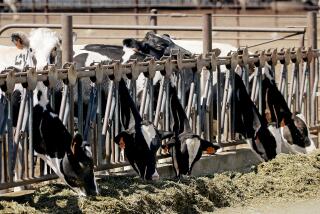Players on Dairy Exchange Hope for Greener Pastures : Commodities: Elsie the cow is the guest of honor at unveiling of futures contracts, which are aimed at minimizing historically wide price swings.
- Share via
NEW YORK — Wall Street, known as a habitat for bulls and bears, made way Tuesday for Elsie the cow.
The 950-pound, tan Jersey dairy cow trotted serenely onto the floor of the Commodity Exchange Center, eight stories up in the World Trade Center complex in Lower Manhattan. The occasion was the unveiling of futures contracts for dairy products on the Coffee, Sugar & Cocoa Exchange, known locally as “The Breakfast Exchange.”
Crude oil traders and sugar brokers chimed in with moos and other barnyard noises from the raucous trading pits, normally a blur of shoving bodies, green elevated computer screens, blinking telephone lights and scraps of trading order forms.
“That’s all we need--another animal in here,” one broker cracked.
At 2:15 p.m., a brass cow bell rang above the din, signaling the beginning of futures and options trading in Cheddar cheese and powdered milk. Some traders, wearing cowhide-print baseball caps for the occasion, seemed more interested in petting the 11-year-old cow than following trading of the new dairy contracts.
Publicity stunts aside, the contracts are designed to minimize wide price swings in dairy products. Cash prices for cheese and nonfat dry milk have varied more than 30% since 1988, partly the result of the government cutting price supports for milk in 1989 and farmers slaughtering cows to reduce surplus milk production.
The trading of futures and options contracts for Cheddar cheese and nonfat dry milk is the culmination of three years of research and development, said Bennett J. Corn, CSCE president.
Major purchasers of cheese and powdered milk--Pizza Hut, McDonald’s and M&M-Mars--are; likely users of the contracts to stabilize the cost of cheese for hamburgers and powdered milk for candy or mozzarella cheese.
Farmers or other commodity producers buy futures contracts to deliver crops or products at a set price several months later. That helps the farmer survive possible price drops caused by poor weather or a glut in supply.
The notion of a Cheddar cheese futures contract received a skeptical reception from Richard J. Gould, president of the National Cheese Exchange in Green Bay, Wis.
“I can tell you one thing--the people I’ve talked to in the industry have kind of questioned it,” Gould said. Dairy industry officials wonder if “there are enough people who are genuinely interested in these contracts.”
“There has to be a lot of people involved in something like this in order for the speculators to come in and buy these contracts.”
The National Cheese Exchange is a cash market that trades only once a week, on Fridays, and then only for about half an hour, he said.
Inside the Commodity Exchange boardroom, Corn addressed his critics while Elsie mooed softly in the background.
The dairy industry lobbied the exchange to develop the contracts, which are traded under the ticker symbols EZ for cheese and, all puns probably intended, MU for powered milk.
More to Read
Inside the business of entertainment
The Wide Shot brings you news, analysis and insights on everything from streaming wars to production — and what it all means for the future.
You may occasionally receive promotional content from the Los Angeles Times.










